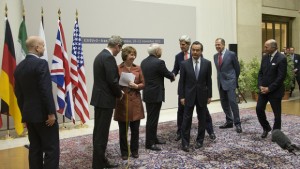 Whether Iran should scale back its missile program and dismantle a mountainside enrichment facility are among issues complicating the task for the Islamic Republic and world powers trying to build on a temporary nuclear accord.
Whether Iran should scale back its missile program and dismantle a mountainside enrichment facility are among issues complicating the task for the Islamic Republic and world powers trying to build on a temporary nuclear accord.The European Union�s foreign-policy chief,�Catherine Ashton, and Iranian Foreign Minister Mohammad Javad Zarif convened a second day of talks today in Vienna, where U.S., U.K., Chinese, French, German and Russian diplomats are attempting to end a decade-long conflict over the nation�s nuclear work.
Negotiators have drafted a framework to guide future discussions, which is expected to be made final in a meeting between Ashton and Zarif tonight, Iran�s state-run IRNA news agency reported. Marie Harf, a U.S. State Department spokeswoman, declined to comment on the report, saying talks will continue tonight and tomorrow morning.
Both sides are signaling limits to compromise before their temporary agreement -- reached in Geneva last Nov. 24 -- expires in July. U.S. officials say they want Iran to dismantle infrastructure and to see United Nations restrictions on Iranian ballistic-missile development enforced. Iran maintains it won�t break down nuclear facilities and says its missile program isn�t up for discussion.
�Tough Things�
�Some tough things have been said publicly since the Geneva agreement,��Robert Einhorn, a member of the U.S. negotiating team until last year and now a senior fellow at the�Brookings Institution�in�Washington, said in an interview. �I see it as exploratory, to test the thinking of the other side on key issues.�
Harf said last night that both sides come to the table �with certain positions in mind clearly, but we do think that we�ve made some progress over the last few days.�
�This round has been quite frankly constructive and useful,� she said.
U.S. officials who asked not to be identified because of the delicacy of the negotiations said earlier this week that discussions over ballistic-missile restrictions are necessary because UN Security Council�resolutions�prohibit Iran from developing technology that could deliver a nuclear weapon. That position may be an early stumbling block.
�We will not allow any other issue aside from the nuclear matter to be introduced in these talks,� Iranian Deputy Foreign Minister Abbas Araghchi told reporters yesterday. �We will underline this in these two days� negotiations.�
�Opening Gambits�
Iran�s�uranium-enrichment�facility near Fordo, burrowed into the side of a mountain and developed in secret, has also drawn scrutiny. U.S. politicians who have threatened to impose new sanctions want that facility dismantled, something that Iran says it won�t do.
�These are the two sides� opening gambits, not their bottom lines,� Ali Vaez, a senior analyst with the Istanbul-based�International Crisis Group, said in an interview. �The reality is there are solutions for all the technical problems. The dilemma is that the same cannot be said about the underlying political differences.�
The current round of meetings in the Austrian capital is the first since the world powers -- known as the P5+1 -- and Iran struck an historic interim accord last year in Geneva. Iran, home to the world�s No. 4 proven oil reserves, won a limited reprieve from sanctions in exchange for suspending its most sensitive nuclear work.
EU Meeting
Ashton will head to an extraordinary EU meeting in Brussels tomorrow over the Ukraine crisis, her spokesman�Michael Mann�said.
The initial Iranian nuclear deal, which may be extended by another six months if talks advance, gave Iran as much as $7 billion in sanctions relief in return for reductions to its enriched-uranium stockpile. Limits to uranium enrichment, plutonium production, international inspections and Iran�s alleged weapons work need to be resolved in a long-term accord.
The�International Atomic Energy Agency�reported in�November 2011�that it had become increasingly concerned about the possible existence�� of �activities related to the development of a nuclear payload for a missile.�
Iran, which conducted ballistic missile tests Feb. 10, says the IAEA has been using faulty intelligence and that it hasn�t pursued nuclear weapons.
No Expertise
While IAEA investigators verify how�Iran�uses its nuclear material and carry out additional inspections mandated by the interim deal, they don�t have expertise in ballistic-missile systems, according to Tariq Rauf, the agency�s former head of verification and security policy.
�The nuclear verification issues in Iran need to be kept separate and distinct from other issues, such as delivery systems,� said Rauf, now a director at the Stockholm International Peace Research Institute. �Introducing extraneous matters will just further complicate an already fraught situation and lead to stalemate.�
Trita Parsi, author of �Single Roll of the Dice: Obama�s Diplomacy with Iran,� said it�s not surprising that both sides have arrived at the first round with �maximalist positions.� Parsi added that the talks will be about U.S. President�Barack Obama�and Iranian President Hassan Rouhani�s �ability to absorb and sell compromise� because �both sides realize that concessions are unavoidable.�
�From now till the end of the talks, expect a rollercoaster,� he said. �There will be moments where the talks may be close to collapsing.�
By Bloomberg�
The Iran Project is not responsible for the content of quoted articles.










